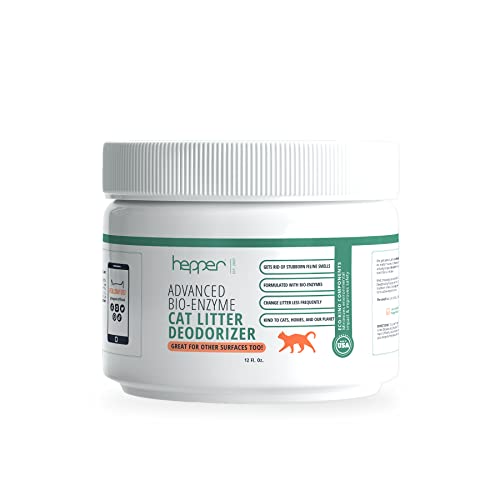Do Cats Pee to Mark Their Territory? Vet-Approved Facts & FAQ
Updated on
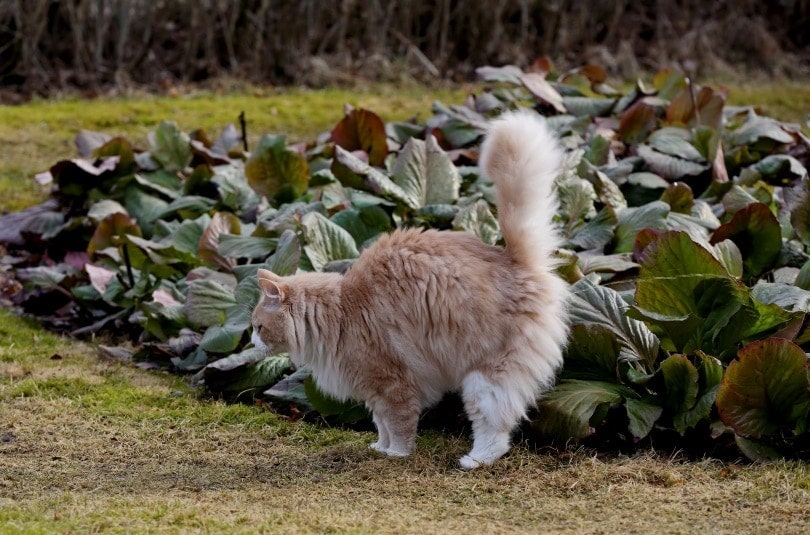
Click to Skip Ahead
Both male and female cats can be territorial, especially in a home where there are other pets. If you have other pets, or if your cat feels as if their territory is threatened in any way, they may be tempted to mark that territory in a number of ways.
Cats can mark their territory by rubbing the scent glands in their cheeks, feet, face, or tail on a variety of surfaces. Marking in this way is often not a big deal to pet owners and can actually be quite adorable. However, another way that cats mark their territory that isn’t quite as pleasant is by peeing.
If your cat is marking its territory by peeing, don’t worry. We’ll explain why your cat might be exhibiting this behavior as well as what you can do to stop it from happening. Continue reading to learn more.
The 3 Reasons Why Cats Mark With Urine
Although cats do pee to mark their territory, we need to explain that a cat ‘peeing’ to mark territory isn’t really peeing to eliminate the urine from its body. When marking, your cat will deposit urine in a specific spot, but the behavior is known as spraying. With that being said, many cat owners might assume that their cat has a problem using the litter box when he or she is actually spraying instead.
Spraying is largely a sign of your cat trying to get a specific message across to either you or another pet (specifically another cat) in or around your household. It has nothing to do with a medical condition or the litter box needing to be cleaned out.
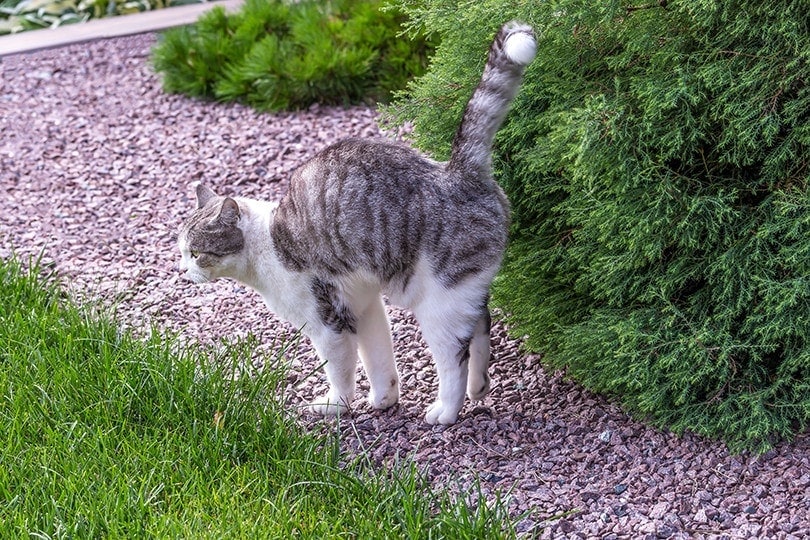
The ultimate reason why a cat sprays is to mark its territory, but there are a couple of reasons why your cat may feel the need to do this. Getting to the underlying cause is the first step toward preventing this problem.
1. Possessiveness
The first reason why a cat may be marking his territory by spraying is to signal ownership to another cat. Your cat could just sense the presence of another cat in the vicinity of your house and is letting the other cat know that he’s there.
2. Wanting to Mate
Your cat could be exhibiting sexual behavior in which he or she is signaling to the other cat that they are available for mating. This is particularly common in cats that haven’t been spayed or neutered.
3. Stress
Another reason why a cat may be marking his or her territory is that it feels threatened or stressed. Any change in your cat’s life, whether that be moving to a new house, bringing a new pet into the house, a general change in routine, or other environmental and social factors can cause stress. In the case of a new pet, the cat may be spraying to let the pet know what areas are “his.” But your cat may also mark new objects that he perceives as sources of conflict.
No matter the reason why your cat is marking, it’s usually an indication that they are trying to tell someone something, whether that be you or another cat. Cats can’t communicate in the way that humans can, so they communicate through their smells, particularly through the smell of their urine and pheromones.
But it’s a lot easier for a cat to figure out what another cat is trying to say by marking than it is for a human. That’s why it’s important to understand what marking actually is and why your cat is doing it.
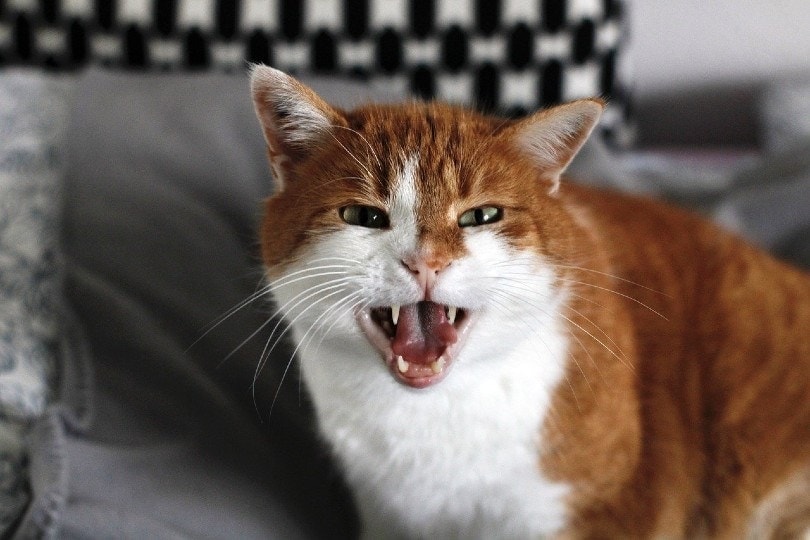
How To Tell If Your Cat Is Spraying
So, how can you tell if what your cat is doing is actually spraying, or if he really is having some sort of problem using the litter box? There are a few key signs to look for with spraying.
1. Vertical Surfaces
The first sign is that spraying usually occurs on a vertical surface rather than a horizontal one. For example, a cat may mark around windows and doors if he or she senses another cat outside. But, they may also spray on plants, chairs, table legs, or even on a wall. If a cat pees on a bed or blanket, it’s most likely due to there being a problem with his litter box, not spraying.
2. Amount
You’ll also need to look at the characteristics of the urine when determining if your cat is spraying. For example, spraying usually results in urine in much lower amounts than if your cat was peeing to eliminate waste. With spraying, your cat’s urine will also have a much stronger smell due to that smell conveying a message to other cats.
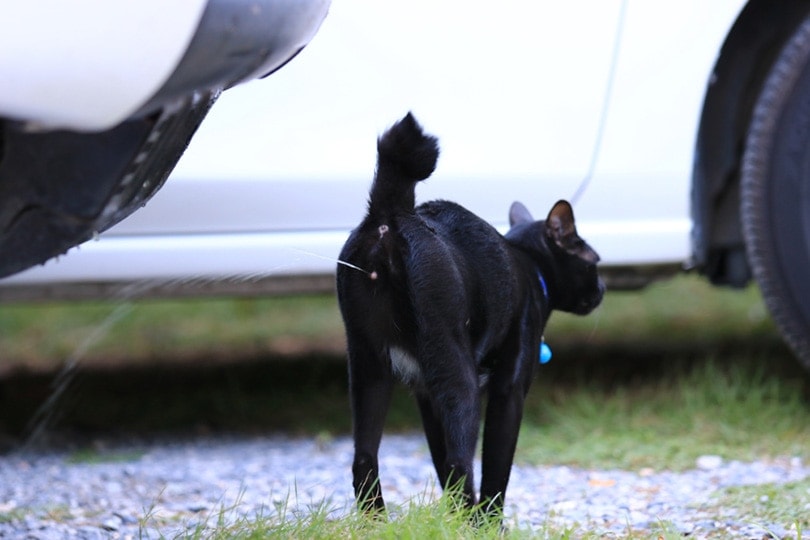
3. Neutered (or Not)
Another sign that your cat may be spraying is if you have a male that has not been neutered. Female cats can also spray, but it is more common in male cats due to them using spraying as a way to indicate that he wants to mate, especially if you have other cats in the home regardless of whether they are spayed or neutered as well.
4. Conflict
Plus, multi-cat homes are more prone to spraying anyway as the cats compete for territory or there is a conflict between cats. Maybe you just brought a new cat home and your cat is feeling a bit anxious. He may mark not because he doesn’t like the other cat but because either he is feeling stressed or he wants to send a clear signal to the other cat about the place being his territory. However, if this is the case, the marking should stop when the cats warm up to each other provided that they are properly introduced.
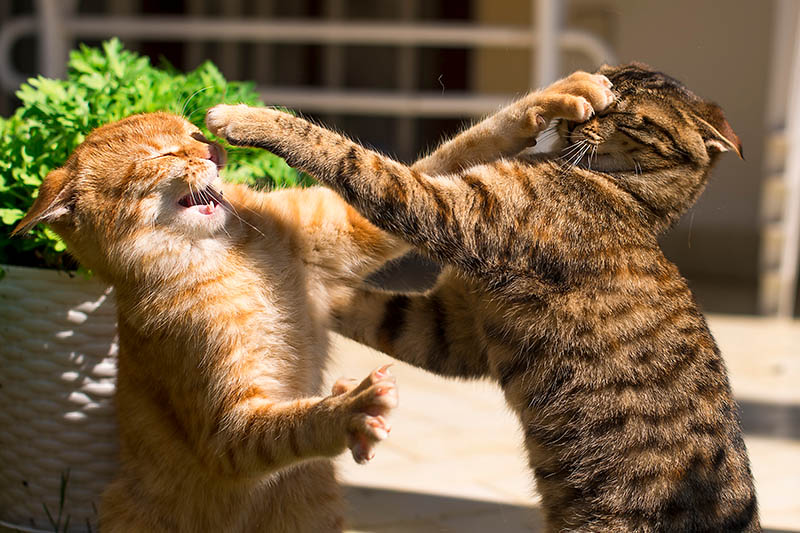
Spraying Prevention Tips
We get it, spraying can be unpleasant, especially because your cat is likely to continue doing it if it isn’t cleaned up properly and you can’t figure out why he or she is doing it in the first place. You’ll need to start by cleaning the marked area with an enzyme-based cleaner designed for pet odors and stains, then get to the source of why your cat is spraying.
Hopefully, you at least have an idea of why your cat might be marking based on the information above. But, the best place to start is by making sure that your cat is spayed or neutered, especially if they aren’t going to be used for breeding purposes. Even if you only have one cat in the home, spaying or neutering will lower the chances that your cat sprays if another cat comes near your house.
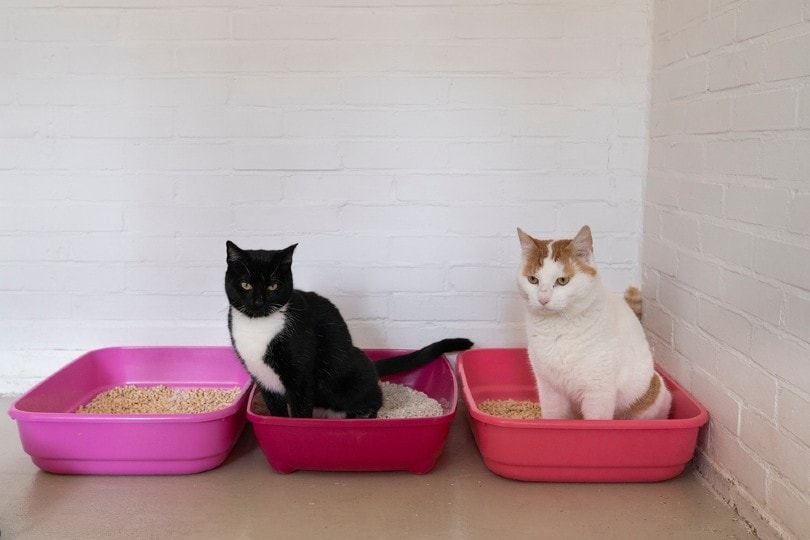
1. Cat Deterrents
If your cat is spayed or neutered and is still marking, it may be harder to figure out why. But, there are a couple of things you can try. For example, if you suspect another cat in your neighborhood is causing your cat to mark, you may want to use a cat deterrent spray or a motion-sensor sprinkler to keep cats away from your yard.
2. Multiple Litter Boxes
If you have multiple cats in your house, make sure to provide plenty of litter boxes and other resources, including food, beds, perches, scratching posts, etc., so that your cats don’t have to share. Clean the litter boxes as frequently as possible just in case the marking is a sign of a litter box problem. Make sure to give your cats equal attention and play with them as well.
Sometimes even the best litter box setup needs a helping hand in combating invasive smells. Our Hepper Advanced Bio-Enzyme Cat Litter Deodorizer naturally breaks down odors at the source. This effective litter additive can help all types of cat litter last longer, saving you money, and is safe for all life stages. Best of all, it's 100% biodegradable and fragrance-free.
- Bio Enzymatic Cat Litter Freshener - Smart formulation uses natural ingredients eliminating cat...
- Save Money - Stuff for cats isn’t the cheapest. With this litter box odor eliminator, you’ll...
3. Call The Vet
If you still aren’t sure why your cat is marking, or you have multiple cats and can’t figure out which one is marking, it’s a good idea to reach out to your veterinarian. He or she can rule out any medical conditions and offer specific ideas and suggestions based on your situation, and possibly even medication to treat anxiety or stress in your cat if that is the source of the problem.
Final Thoughts
While some forms of marking in cats can be adorable, such as when they rub up against you, marking with urine, aka spraying, is not adorable or pleasant. Spraying is usually done as a way to mark territory, but the exact reason why your cat is doing this can vary. Figuring out the cause is the first step toward preventing the problem, but you may need to reach out to your vet for specific advice on how to stop this unpleasant and unwanted behavior.
Related Reads:
- Do Cats Pee When They’re Scared? Deciphering Cat Behavior
- Do Cats Have a Favorite Person? How Do They Choose That Person?
Featured Image Credit: Elisa Putti, Shutterstock




